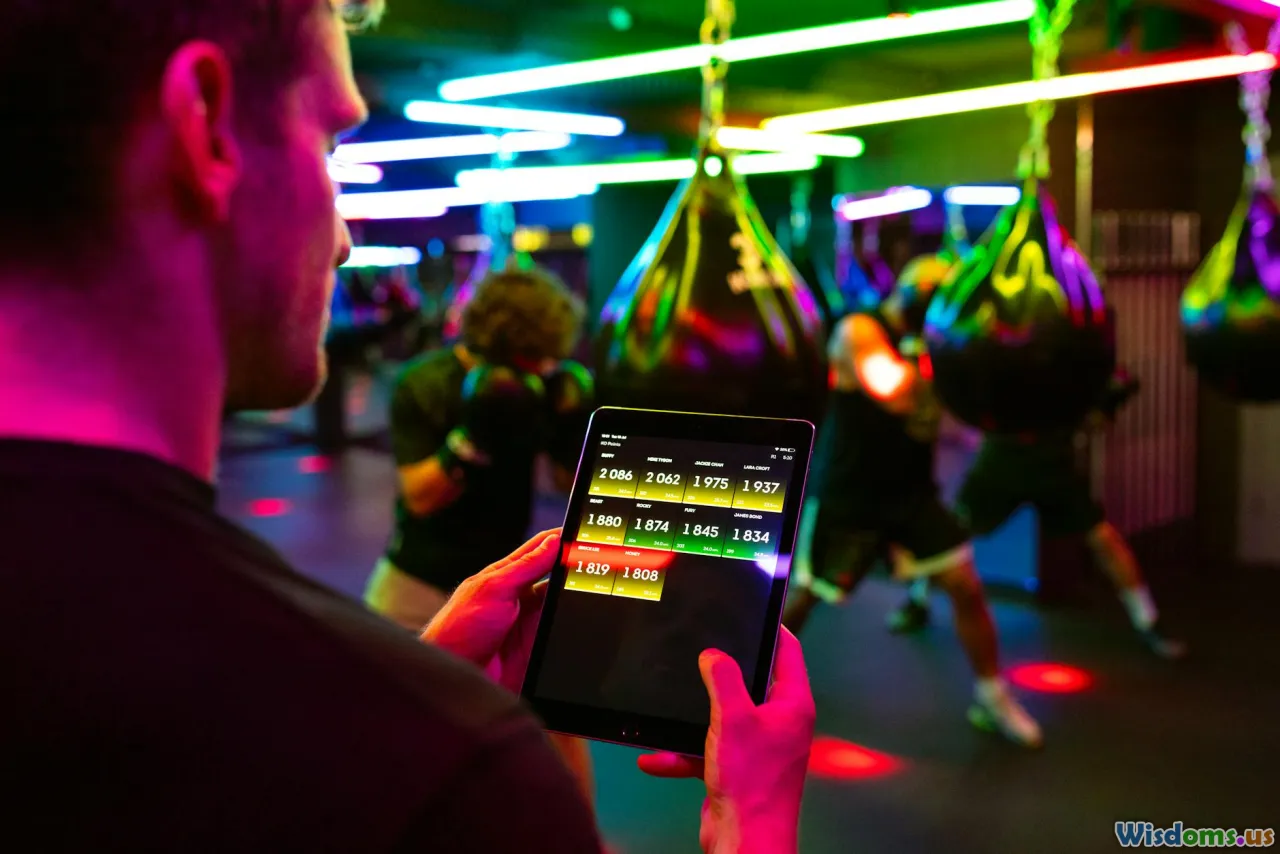
Personal Trainers vs AI Fitness Apps Detailed Cost Analysis
16 min read In-depth cost comparison between hiring personal trainers and using AI fitness apps, highlighting key differences in pricing, value, and effectiveness. (0 Reviews)
Personal Trainers vs AI Fitness Apps: A Detailed Cost Analysis
Choosing the right fitness support can be a daunting task. In a world where advancements in technology are rapidly reshaping countless aspects of our lives, even how we work out is undergoing dramatic change. Traditional personal trainers, long the gold standard for individualized guidance and motivation, now face growing competition from AI-powered fitness applications promising effective, budget-friendly coaching. But which actually offers the most value for your money?
This in-depth analysis unpacks the true costs—financial and otherwise—of both personal trainers and leading AI fitness apps. Whether you're considering investing in bespoke training or leveraging technology for self-guided improvement, understanding the expense, value, and trade-offs will help you make the best decision for your fitness journey.
What Do You Get? Comparing Features and Value

Before jumping into cost comparisons, it's crucial to break down what each option offers. Pricing often reflects levels of personalization, accountability, and accessibility.
Personal Trainers: Human Expertise and Motivation
Personal trainers offer more than just workout routines:
- Individualized Assessment: Trainers tailor programs to your goals, injuries, and fitness level. For example, a certified trainer will consider a client’s knee rehabilitation, adjusting routines to avoid strain.
- Dynamic Modifications: They update plans on-the-fly based on client progress, preferences, and even daily moods.
- Form Correction: Careful observation helps prevent injuries through real-time technique coaching.
- Accountability: Set appointments and personal interaction often improve consistency—studies show people are more likely to stick with a program if someone’s expecting them.
- Nutritional Guidance: Many trainers provide dietary advice or collaborate with nutrition professionals.
Example: Amy, a new gym-goer, reports increased confidence in learning weightlifting skills and avoiding plateaus thanks to her trainer’s attention—something a generic plan failed to provide previously.
AI Fitness Apps: Scalable, Personalized Algorithms
AI-powered fitness apps leverage data and digital coaching:
- Personalized Plans: Many apps (e.g., Freeletics, Nike Training Club) generate custom workouts based on goals, fitness level, or previous results.
- Adaptability: AI can adjust intensity or exercises after each workout based on user feedback or performance metrics collected via smartphone sensors or wearables.
- On-Demand Access: Exercise anytime and anywhere, removing the need to stick to trainer schedules.
- Progress Tracking: Built-in analytics enable data-driven progress reviews.
- Community & Gamification: Many offer leaderboards, forums, and rewards to mimic some social aspects of personal training.
Example: John, a busy professional, finds success with an AI app that suggests short, focused workouts that adapt whenever he misses a session, optimizing his limited gym time while traveling.
Cost Breakdown: Personal Trainers

The price tag for a personal trainer involves several layers and often varies greatly depending on location, credentials, and training environment.
Starting Rates: What to Expect
- One-on-One Sessions: In the US, personal trainers typically charge between $40 and $120 per hour. According to the National Federation of Professional Trainers (NFPT), the average is around $60 per hour.
- Package Deals: Many offer reduced rates for buying sessions in bulk. For example, committing to 10 sessions upfront may drop the price to $50 per session.
- Special Certifications: Trainers with expertise in rehab, specialties (yoga, sports-specific), or nutrition may charge $80–$150 per hour.
- Elite or Celebrity Trainers: Premier locations or well-known trainers often exceed $150+ per session.
Hidden or Related Expenses
- Gym Memberships: Some gyms require a separate membership, adding $30–$100/mo.
- Travel Costs: In-home or private studio sessions might involve travel fees or higher rates.
- Cancellation Fees: Last-minute cancellations can incur charges—review policies ahead of time.
Example Cost: A client training twice per week at $60/session, over three months:
- Per Session: $60
- Total Sessions: 24 (2/wk × 12 wks)
- Total Cost: $1,440 + potential gym fees (~$90) = $1,530
If a client trains year-round, costs can quickly exceed $6,000 annually.
Cost Breakdown: AI Fitness Apps

AI fitness apps tout affordability and accessibility as major selling points compared to traditional training.
Typical Pricing Models
- Free Versions: Many leading apps (e.g., FitOn, Adidas Training) offer basic workouts with ads or limited access.
- Monthly Subscriptions: Paid tiers range between $8 and $30 per month giving full access to workouts, AI features, and premium content.
- Annual Plans: Committing annually nets a discount (often $80–$200 per year), which equals about $7–$17 per month.
- In-App Purchases: Some lock advanced features or tailored dietary plans behind extra fees.
Feature Upgrades and Extras
- Wearables Integration: Syncing with smartwatches or fitness trackers (Apple Watch, Garmin) sometimes requires a pricier subscription.
- Nutrition Plans: Apps often bundle calorie tracking, meal plans, or recipes at no additional charge—or for a modest add-on.
Example Cost: Using a popular AI-enabled app like Freeletics:
- Monthly Subscription: $12
- Annual Cost: $144
- Optionally, smart coaching add-ons or specialty programs can raise this to $150–$200 per year.
Versus individual training, leveraging a premium app for 12 months costs less than two weeks of one-on-one personal sessions.
Long-Term Affordability

Evaluating value over time highlights stark differences.
Personal Training: Recurring, Premium Investment
- Annual Outlay: Just one session/week averages $3,000/year; two sessions/week doubles that. Extras like nutrition coaching may inflate costs.
- Return on Investment: Greatest when professional oversight is needed—e.g., beginners, injury recovery, or advanced sport-specific prep.
- Flexibility: Cost doesn't easily scale down—reducing appointments diminishes accountability and guidance.
AI Apps: Predictable, Compact Costs
- Annual Outlay: Rarely exceeds $200, often much less for basic usage.
- Family/Household Plans: Many apps let multiple users share one subscription—for families or roommates, this divides the cost per user further.
- Hidden Savings: Lower risk of wasted investment (unused gym visits, missed sessions).
Real World Example:
- Using a $120/mo personal trainer: $1,440/yr
- Using a $15/mo premium fitness app: $180/yr
A five-year calculation buffers the gap, from $9,000 vs $900.
Beyond Price: Comparing Effectiveness, Accountability, and Experience

Money isn't the only metric; what you get for your budget can differ significantly between options.
Effectiveness and Accountability
- Personal Trainers: Face-to-face interaction builds relationships and drives commitment. A 2017 study in the Journal of Sports Science & Medicine found higher adherence among those working with personal trainers versus self-guided exercisers.
- AI Fitness Apps: Machine learning tailors plans, and push notifications remind users to work out. However, self-motivation is key. Gamification helps, but dropout rates are higher without real-world accountability—according to a 2021 market report, over 60% of fitness app downloads get abandoned within 90 days.
Experience and Support
- Personal Trainers: Immediate adaptation to injuries, answering questions, demonstrating proper form, and adjusting workouts real-time.
- AI Apps: Rapid, 24/7 access with video guidance and analytics. Limited to pre-programmed FAQs and fitness scripts—complex adjustments (like working around a new injury) are less precise unless highly advanced or regularly updated.
Customization and Progress Tracking

Personalized Programs
- Human Trainers: Adjust plans after every session, offering nuanced changes based on everything from your emotional state to that day's energy levels. For instance, they can instantly add a mobility segment if you mention tightness.
- AI Apps: Use your workout data, heart rate, and other feedback for algorithmic changes—e.g., adjusting running intensity based on prior performance. Some, like Future or Freeletics, approach semi-personalized coaching with regular human check-ins, but these are typically at higher price tiers.
Progress Feedback
- Personal Trainers: Offer recognition, explain setbacks, and celebrate achievements—building a sense of accomplishment tailored to your personality.
- Apps: Rely on charts, streak counters, and stat badges to keep motivation up. Great for those who love seeing data-driven results, but may feel impersonal for others.
Hidden Costs: Time, Flexibility, and Opportunity

The sticker price isn't everything. Consider these often-overlooked costs:
- Time: Trainer sessions are scheduled—missed appointments can cost money and momentum. Some people thrive with set times, while others need flexibility.
- Accessibility: Rural or traveling clients may struggle to find high-quality trainers, forcing them to compromise or pay premiums for special locations.
- Energy and Commitment: Working with a person may require more emotional investment; some feel embarrassed or pressured, which can backfire if not matched with the right professional.
AI apps excel in self-paced usage but can lack creative adaptation when users hit plateaus or special circumstances arise.
Blended Solutions: Best of Both Worlds?

A growing middle ground is emerging—the hybrid approach.
- Online Training: Some trainers now offer remote sessions, using apps (like Trainerize) to assign, review, and comment on workouts for a lower cost—often $50–$100/month, depending on access and customization levels.
- App-Enhanced In-Person Coaching: Many trainers integrate apps to track client metrics, set reminders, and even offer quick check-ins between live meetings. This blend cuts overall costs while maintaining many benefits of each approach.
- AI Apps with Real Coaches: Services like Future pair users with credentialed coaches who review performance data and offer ongoing, asynchronous advice—balancing affordability and personalization.
Example: Sarah uses an AI-guided app for daily workouts and checks in virtually with her remote coach every two weeks, reducing out-of-pocket costs while still benefiting from professional accountability.
Making the Right Choice for Your Goals

When making your decision, consider these actionable questions:
-
What are my goals?
- Weight loss or general fitness: Apps may suffice, especially if self-motivated.
- Rehabilitation, complex needs, or sport-specific goals: A trainer’s expertise likely warrants the higher fee.
-
How much support do I need?
- Do you need someone standing by every rep, or are you comfortable following app/video guidance?
-
What’s my budget and schedule flexibility?
- Factor in commuting, gym fees, or tech requirements (smartphone, wearable).
-
Would a hybrid approach best balance my needs and finances?
- Combining affordable tech with periodic expert feedback can be highly cost-effective long-term.
Final Thoughts
Personal trainers offer irreplaceable expertise and motivation—at a price reflecting tailored human interaction. AI fitness apps provide impressive customization, accessibility, and affordability, continuously improving as technology advances.
For some, especially those valuing convenience and cost savings, AI apps will more than fulfill their fitness needs. For others, particularly those starting out or facing special challenges, the higher cost of a professional trainer may yield much better results. Whichever path you choose, a thoughtful analysis of both value and expenses ensures your investment delivers on your fitness ambitions.
Rate the Post
User Reviews
Popular Posts















